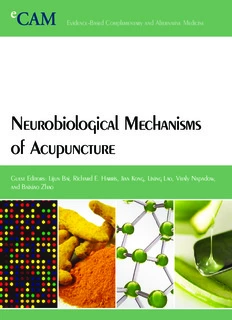
Neurobiological Mechanisms of Acupuncture PDF
Preview Neurobiological Mechanisms of Acupuncture
Evidence-Based Complementary and Alternative Medicine Neurobiological Mechanisms of Acupuncture Guest Editors: Lijun Bai, Richard E. Harris, Jian Kong, Lixing Lao, Vitaly Napadow, and Baixiao Zhao Neurobiological Mechanisms of Acupuncture Evidence-Based Complementary and Alternative Medicine Neurobiological Mechanisms of Acupuncture Guest Editors: Lijun Bai, Richard E. Harris, Jian Kong, Lixing Lao, Vitaly Napadow, and Baixiao Zhao Copyright©2013HindawiPublishingCorporation.Allrightsreserved. Thisisaspecialissuepublishedin“Evidence-BasedComplementaryandAlternativeMedicine.”Allarticlesareopenaccessarticles distributedundertheCreativeCommonsAttributionLicense,whichpermitsunrestricteduse,distribution,andreproductioninany medium,providedtheoriginalworkisproperlycited. Editorial Board M.AmeenAbdulla,Malaysia Jen-HweyChiu,Taiwan JingHu,China JonAdams,Australia C.S.Cho,HongKong GanSiewHua,Malaysia ZurainiAhmad,Malaysia JaeYoulCho,Korea Sheng-TengHuang,Taiwan U.P.deAlbuquerque,Brazil Seung-HunCho,RepublicofKorea BennyTanKwongHuat,Singapore GianniAllais,Italy CheeYanChoo,Malaysia RomanHuber,Germany TerjeAlraek,Norway Li-FangChou,Taiwan AngeloAntonioIzzo,Italy SoulimanAmrani,Morocco RyowonChoue,RepublicofKorea SureshJadhav,India AkshayAnand,India Shuang-EnChuang,Taiwan KanokwanJarukamjorn,Thailand ShrikantAnant,USA Joo-HoChung,RepublicofKorea ZhengL.Jiang,China ManuelArroyo-Morales,Spain EdwinL.Cooper,USA YongJiang,China S.M.B.Asdaq,SaudiArabia GregoryD.Cramer,USA StefanieJoos,Germany SeddighehAsgary,Iran MengCui,China SirajudeenK.N.S.,Malaysia HyunsuBae,RepublicofKorea R.K.NakamuraCuman,Brazil Z.Kain,USA LijunBai,China VincenzoDeFeo,Italy OsamuKanauchi,Japan SandipK.Bandyopadhyay,India R.DelaPuertaVa´zquez,Spain WenyiKang,China SarangBani,India MartinDescarreaux,USA DaeGillKang,RepublicofKorea VassyaBankova,Bulgaria AlexandraDeters,Germany Shao-HsuanKao,Taiwan WinfriedBanzer,Germany S.S.K.Durairajan,HongKong KrishnaKaphle,Nepal VernonA.Barnes,USA MohamedEddouks,Morocco KenjiKawakita,Japan SamraBashir,Pakistan ThomasEfferth,Germany JongYeolKim,RepublicofKorea JairoKenuppBastos,Brazil TobiasEsch,Germany YounChulKim,RepublicofKorea SujitBasu,USA SaeedEsmaeili-Mahani,Iran Cheorl-HoKim,RepublicofKorea DavidBaxter,NewZealand NianpingFeng,China YoshiyukiKimura,Japan Andre-MichaelBeer,Germany YibinFeng,HongKong JoshuaK.Ko,China AlvinJ.Beitz,USA JosueFernandez-Carnero,Spain ToshiakiKogure,Japan Y.ChoolBoo,RepublicofKorea JulianoFerreira,Brazil JianKong,USA FrancescaBorrelli,Italy FabioFirenzuoli,Italy NandakumarKrishnadas,India GloriaBrusotti,Italy PeterFisher,UK YiuWaKwan,HongKong IshfaqA.Bukhari,Pakistan W.F.Fong,HongKong KuangChiLai,Taiwan ArndtBu¨ssing,Germany JoelJ.Gagnier,Canada ChingLan,Taiwan RainerW.Bussmann,USA Jian-LiGao,China AlfredLa¨ngler,Germany RaffaeleCapasso,Italy GabinoGarrido,Chile LixingLao,HongKong OpherCaspi,Israel M.NabeelGhayur,Pakistan ClaraBik-SanLau,HongKong HanChae,Korea AnwarulHassanGilani,Pakistan Jang-HernLee,RepublicofKorea Shun-WanChan,HongKong MichaelGoldstein,USA MyeongSooLee,RepublicofKorea Il-MooChang,RepublicofKorea MahabirP.Gupta,Panama TatleangLee,Singapore RajnishChaturvedi,India SveinHaavik,Norway ChristianLehmann,Canada ChunTaoChe,USA AbidHamid,India MarcoLeonti,Italy HubiaoChen,HongKong N.Hanazaki,Brazil Ping-ChungLeung,HongKong Jian-GuoChen,China K.B.Harikumar,India LawrenceLeung,Canada KevinChen,USA CoryS.Harris,Canada KwokNamLeung,HongKong Tzeng-JiChen,Taiwan ThierryHennebelle,France PingLi,China YunfeiChen,China Seung-HeonHong,Korea MinLi,China Juei-TangCheng,Taiwan MarkusHorneber,Germany ManLi,China EvanPaulCherniack,USA Ching-LiangHsieh,Taiwan ChunGuangLi,Australia Xiu-MinLi,USA AndreaPieroni,Italy MeiTian,China ShaoLi,China RichardPietras,USA EvelinTiralongo,Australia YongHongLiao,China WarisQidwai,Pakistan StephanieTjen-A-Looi,USA SabinaLim,Korea XianqinQu,Australia MichaThlTomczyk,Poland WenChuanLin,China CassandraL.Quave,USA YaoTong,HongKong Bi-FongLin,Taiwan RojaRahimi,Iran K.V.Trinh,Canada ChristopherG.Lis,USA KhalidRahman,UK KarlWah-KeungTsim,HongKong GerhardLitscher,Austria CheppailRamachandran,USA VolkanTugcu,Turkey I-MinLiu,Taiwan GamalRamadan,Egypt Yew-MinTzeng,Taiwan KeLiu,China KeRen,USA DawnM.Upchurch,USA GaofengLiu,China ManHeeRhee,RepublicofKorea MarynaVandeVenter,SouthAfrica YijunLiu,USA Mee-RaRhyu,RepublicofKorea SandyvanVuuren,SouthAfrica Cun-ZhiLiu,China Jose´LuisR´ıos,Spain AlfredoVannacci,Italy GailB.Mahady,USA PaoloRobertidiSarsina,Italy ManiVasudevan,Malaysia JurajMajtan,Slovakia BasharSaad,PalestinianAuthority CarloVentura,Italy SubhashC.Mandal,India SumairaSahreen,Pakistan WagnerVilegas,Brazil JeanineL.Marnewick,SouthAfrica OmarSaid,Israel PradeepVisen,Canada VirginiaS.Martino,Argentina LuisA.Salazar-Olivo,Mexico AristoVojdani,USA JamesH.McAuley,Australia Mohd.ZakiSalleh,Malaysia Y.Wang,USA KarinMeissner,Germany AndreasSandner-Kiesling,Austria Shu-MingWang,USA AndreasMichalsen,Germany AdairSantos,Brazil ChenchenWang,USA DavidMischoulon,USA G.Schmeda-Hirschmann,Chile Chong-ZhiWang,USA SyamMohan,Malaysia AndrewScholey,Australia KenjiWatanabe,Japan J.Molnar,Hungary VeroniqueSeidel,UK JintanapornWattanathorn,Thailand Vale´rioMonteiro-Neto,Brazil SenthamilR.Selvan,USA WolfgangWeidenhammer,Germany Hyung-InMoon,RepublicofKorea TuhinadriSen,India JennyM.Wilkinson,Australia AlbertMoraska,USA HongcaiShang,China DarrenR.Williams,RepublicofKorea MarkMoss,UK KarenJ.Sherman,USA HarukiYamada,Japan YoshiharuMotoo,Japan RonaldSherman,USA NobuoYamaguchi,Japan FraukeMusial,Germany KuniyoshiShimizu,Japan Yong-QingYang,China MinKyunNa,RepublicofKorea KanShimpo,Japan JunqingYang,China RichardL.Nahin,USA Byung-CheulShin,Korea LingYang,China VitalyNapadow,USA YukihiroShoyama,Japan EunJinYang,RepublicofKorea F.R.F.Nascimento,Brazil ChangGueSon,Korea XiufenYang,China ShivanandaNayak,TrinidadAndTobRaagcohidSoulimani,France KenYasukawa,Japan RolandNdipNdip,SouthAfrica DidierStien,France MinYe,China IsabellaNeri,Italy Shan-YuSu,Taiwan M.Yoon,RepublicofKorea T.BenoˆıtNguelefack,Cameroon MohdRoslanSulaiman,Malaysia JieYu,China MartinOffenbaecher,Germany VenilN.Sumantran,India ZunjianZhang,China Ki-WanOh,RepublicofKorea JohnR.S.Tabuti,Uganda Jin-LanZhang,China Y.Ohta,Japan TokuTakahashi,USA WeiboZhang,China OlumayokunA.Olajide,UK RabihTalhouk,Lebanon HongQ.Zhang,HongKong ThomasOstermann,Germany YupingTang,China BoliZhang,China StaceyA.Page,Canada Wen-FuTang,China RuixinZhang,USA Tai-LongPan,Taiwan LayKekTeh,Malaysia HongZhang,Sweden BhushanPatwardhan,India MayankThakur,Germany HaiboZhu,China BeritSmestadPaulsen,Norway MenakaC.Thounaojam,India Contents NeurobiologicalMechanismsofAcupuncture,LijunBai,RichardE.Harris,JianKong,LixingLao, VitalyNapadow,andBaixiaoZhao Volume2013,ArticleID652457,2pages EffectsofPretreatmentwithaCombinationofMelatoninandElectroacupunctureinaRatModelof TransientFocalCerebralIschemia,LingguangLiuandR.T.F.Cheung Volume2013,ArticleID953162,12pages ElectroacupunctureStimulationatCV12InhibitsGastricMotilityviaTRPV1Receptor,ZhiYu,XinCao, YoubingXia,BinbinRen,HongFeng,YaliWang,JingfengJiang,andBinXu Volume2013,ArticleID294789,6pages NeuralEncodingofAcupunctureNeedlingSensations:EvidencefromafMRIStudy,XiaolingWang, Suk-TakChan,JiliangFang,ErikaE.Nixon,JingLiu,KennethK.Kwong,BruceR.Rosen, andKathleenK.S.Hui Volume2013,ArticleID483105,15pages EffectofBeeVenomAcupunctureonOxaliplatin-InducedColdAllodyniainRats,Bong-SooLim, HakJinMoon,DongXingLi,MunsooGil,JoonKiMin,GiseogLee,HyunsuBae,SunKwangKim, andByung-IlMin Volume2013,ArticleID369324,8pages MultivariateGrangerCausalityAnalysisofAcupunctureEffectsinMildCognitiveImpairment Patients:AnfMRIStudy,ShangjieChen,LijunBai,MaoshengXu,FangWang,LiangYin,XumingPeng, XinghuaChen,andXueminShi Volume2013,ArticleID127271,12pages MechanismsofElectroacupuncture-InducedAnalgesiaonNeuropathicPaininAnimalModel, WoojinKim,SunKwangKim,andByung-IlMin Volume2013,ArticleID436913,11pages ElectroacupunctureCouldRegulatetheNF-𝜅BSignalingPathwaytoAmelioratetheInflammatory InjuryinFocalCerebralIschemia/ReperfusionModelRats,Wen-yiQin,YongLuo,LingChen,TaoTao, YangLi,Yan-liCai,andYa-huiLi Volume2013,ArticleID924541,15pages Acupuncture-EvokedResponseinSomatosensoryandPrefrontalCorticesPredictsImmediatePain ReductioninCarpalTunnelSyndrome,YumiMaeda,NormanKettner,JeungchanLee,JieunKim, StephenCina,CristinaMalatesta,JessicaGerber,ClaireMcManus,JaehyunIm,AlexandraLibby, PiaMezzacappa,LeslieR.Morse,KyungmoPark,JosephAudette,andVitalyNapadow Volume2013,ArticleID795906,13pages PlaceboAcupunctureDevices:ConsiderationsforAcupunctureResearch,DanZhu,YingGao, JinglingChang,andJianKong Volume2013,ArticleID628907,9pages Hypothalamus-RelatedRestingBrainNetworkUnderlyingShort-TermAcupunctureTreatmentin PrimaryHypertension,HongyanChen,JianpingDai,XiaozheZhang,KaiWang,ShuhuaHuang, QingtianCao,HongWang,YuhongLiang,ChuanyingShi,MengyuanLi,TingtingHa,LinAi,ShaowuLi, JunMa,WenjuanWei,YouboYou,ZhenyuLiu,JieTian,andLijunBai Volume2013,ArticleID808971,9pages AcupunctureEffectandCentralAutonomicRegulation,Qian-QianLi,Guang-XiaShi,QianXu, JingWang,Cun-ZhiLiu,andLin-PengWang Volume2013,ArticleID267959,6pages fMRIEvidenceofAcupointsSpecificityinTwoAdjacentAcupoints,HuaLiu,Jian-YangXu,LinLi, Bao-CiShan,Bin-BinNie,andJing-quanXue Volume2013,ArticleID932581,5pages VisceralNociceptiveAfferentFacilitatesReactionofSubnucleusReticularisDorsalistoAcupoint StimulationinRats,LiangLi,LinglingYu,PeijingRong,HuiBen,XiaLi,BingZhu,andRixinChen Volume2013,ArticleID931283,7pages NeurobiologicalFoundationsofAcupuncture:TheRelevanceandFutureProspectBasedon NeuroimagingEvidence,LijunBaiandLixingLao Volume2013,ArticleID812568,9pages EffectsofMoxaSmokeonMonoamineNeurotransmittersinSAMP8Mice,HuanfangXu,BaixiaoZhao, YingxueCui,MinYeeLim,PingLiu,LiHan,HongzhuGuo,andLixingLao Volume2013,ArticleID178067,6pages EnhancedAntidepressant-LikeEffectsofElectroacupunctureCombinedwithCitalopraminaRat ModelofDepression,JianYang,YuPei,Yan-LiPan,JunJia,ChenShi,YanYu,Jia-HuiDeng,BoLi, Xiao-LiGong,XuanWang,Xiao-MinWang,andXinMa Volume2013,ArticleID107380,12pages ModulationofBrainElectroencephalographyOscillationsbyElectroacupunctureinaRatModelof PostincisionalPain,JingWang,JingWang,XuezhuLi,DuanLi,Xiao-LiLi,Ji-ShengHan,andYouWan Volume2013,ArticleID160357,11pages Long-TermStimulationwithElectroacupunctureatDU20andST36RescuesHippocampalNeuron throughAttenuatingCerebralBloodFlowinSpontaneouslyHypertensiveRats,Gui-HuaTian,KaiSun, PingHuang,Chang-ManZhou,Hai-JiangYao,Ze-JunHuo,Hui-FengHao,LeiYang,Chun-ShuiPan, KeHe,Jing-YuFan,Zhi-GangLi,andJing-YanHan Volume2013,ArticleID482947,10pages SpinalSerotonergicandOpioidReceptorsAreInvolvedinElectroacupuncture-Induced AntinociceptionatDifferentFrequenciesonZuSanLi(ST36)Acupoint,Chi-ChungKuo, Huei-YannTsai,Jaung-GengLin,Hong-LinSu,andYuh-FungChen Volume2013,ArticleID291972,10pages ThePossibleNeuronalMechanismofAcupuncture:MorphologicalEvidenceoftheNeuronal ConnectionbetweenGroinA-ShiPointandUterus,Chun-YenChen,Rey-ShyongChern, Ming-HueiLiao,Yung-HsienChang,Jung-YuC.Hsu,andChi-HsienChien Volume2013,ArticleID429186,13pages HindawiPublishingCorporation Evidence-BasedComplementaryandAlternativeMedicine Volume2013,ArticleID652457,2pages http://dx.doi.org/10.1155/2013/652457 Editorial Neurobiological Mechanisms of Acupuncture LijunBai,1RichardE.Harris,2JianKong,3LixingLao,4 VitalyNapadow,5andBaixiaoZhao6 1TheKeyLaboratoryofBiomedicalInformationEngineering,MinistryofEducation,DepartmentofBiomedicalEngineering, SchoolofLifeScienceandTechnology,Xi’anJiaotongUniversity,Xi’an710049,China 2DepartmentofAnesthesiology,UniversityofMichigan,AnnArbor,MI48109,USA 3DepartmentofPsychiatry,MassachusettsGeneralHospital(MGH),HarvardMedicalSchool,Boston,MA02129,USA 4SchoolofChineseMedicine,TheUniversityofHongKong,10SassoonRoad,Pokfulam,HongKong 5MGH/HMS/MITMartinosCenterforBiomedicalImaging,MassachusettsGeneralHospital,HarvardMedicalSchool, Boston,MA02129,USA 6SchoolofAcupuncture-MoxibustionandTuina,BeijingUniversityofChineseMedicine,Beijing100029,China CorrespondenceshouldbeaddressedtoLijunBai;[email protected] Received24November2013;Accepted24November2013 Copyright©2013LijunBaietal.ThisisanopenaccessarticledistributedundertheCreativeCommonsAttributionLicense,which permitsunrestricteduse,distribution,andreproductioninanymedium,providedtheoriginalworkisproperlycited. Acupuncture, an age-old healing art, has been accepted to andtreatmentevaluations,D.Zhuetal.outlinedtheadvan- effectively treat various diseases, particularly chronic pain tages and disadvantages of kinds of acupuncture controls and neurodegenerative diseases. Since its public acceptance andhighlightedhowthedifferencesamongplacebodevices and good efficacy, increasing attention has been now paid can be used to isolate distinct components of acupuncture toexploringthephysiologicalandbiochemicalmechanisms treatment. underlyingacupuncture,particularlythebrainmechanisms. Fivepapersdealwithpotentialneuralmechanismunder- Basic and clinical acupuncture studies on neurobiological lying acupuncture treatments on the stroke, hypertension, mechanismsofacupuncturearecrucialforthedevelopment andmildcognitiveimpairments.ThepaperbyL.LiuandR. ofacupuncture.Thisissuecompiles32excitingpapers,most T. F. Cheungaimedto investigatewhetherthecombination of which are very novel and excellent investigations in this of melatonin and electroacupuncture therapies could be field. beneficial against transient focal cerebral ischemia in a rat The neural mechanism underlying acupuncture anal- modeloftransientmiddlecerebralarteryocclusion.W.Qin gesia was addressed in four articles. J. Wang et al. estab- et al. accompanied by L. Liu and R. T. F. Cheung’s paper lished a postincisional pain model of rats and investigated explored the importance of anti-inflammatory acupuncture electroacupuncture effect on the brain oscillations involv- treatment for the focal cerebral ischemia/reperfusion by ing postoperative pain. B.-S. Lim et al., using interesting inhibitingtheNF-𝜅Bsignalingpathway.Anothertwopapers bee venom acupuncture, explored whether it can relieve mainly focused on the acupuncture modulation of neural oxaliplatin-induced cold allodynia and which endogenous mechanism for hypertension regulation with long-term as analgesic system is implicated. The paper by Y. Maeda et well as short-term treatments. The paper by G.-H. Tian et al. aimed to evaluate this linkage between brain response al. addressed the long-term electroacupuncture on cerebral to acupuncture and subsequent analgesia in chronic pain microvessels and neurons in CA1 region of hippocampus patients with carpal tunnel syndrome. Since many articles in spontaneously hypertensive rats. H. Chen et al. aimed aimedtoassesstheeffectofelectroacupunctureinducedanal- to explore the hypothalamus-anchored resting brain net- gesia,W.Kimetal.systemicallyconductedareviewtoassess workunderlyingprimaryhypertensionpatientsaftershort- theefficacyandclarifyitsmechanismonneuropathicpain. term acupuncture treatments. Moreover, for mild cognitive In addition, as a great challenge in acupuncture analgesia impairments,S.Chenetal.havepointedoutthatacupuncture 2 Evidence-BasedComplementaryandAlternativeMedicine atKI3atdifferentcognitivestatesandwithvaryingneedling depthsmayinducedistinctreorganizationsofeffectivecon- nectivityofbrainnetworks. The neuroendocrine system involving acupuncture has been addressed by the following three papers. Z. Yu et al. hassuggestedthatTRPV1receptorispartiallyinvolvedinthe electroacupuncture-mediatedmodulationofgastricmotility. The paper by C.-C. Kuo et al. explored the mechanism of electroacupuncture(EAc)inducedantinociceptioninvolved opioidreceptorsandtheserotonergicsystem.Q.-Q.Lietal. conducted a systemic review about the central mechanism ofacupunctureinmodulatingvariousautonomicresponses. Moreover, other papers focused on the relatively acupoint specificity fromwide aspects. Oneofthestudies by L. Liet al.suggestedthatboththesizeandfunctionoftheacupoints comply with the functionality of the internal organs; thus the sensitive degree of acupoints changed according to malfunctionofinternalorgans.C.-Y.Chenetal.impliedthat somatoparasympathetic neuronal connection (groin-spinal dorsal horn-NTS/DMX-uterus) and a somatosympathetic neuronal connection (groin-spinal dorsal horn-NTS-PVN- uterus) could be the prerequisites to the neuronal basis of the somatovisceral reflex and also the neuronal mechanism ofacupuncture.Z.Wangetal.advancedthatthemodulatory effectsofdifferentneedlingsensationsinducedbyrelatively different acupoints contribute to acupuncture modulations oflimbic-paralimbic-neocorticalnetwork.Althoughtheacu- pointswerespatiallyadjacent,therewasalsorelativelyfunc- tionalspecificityinflectedbybrainnetworks. Bygatheringthesepapers,wehopetoenrichourreaders andresearcherswithrespecttotheunderlyingneurological mechanism of acupuncture, and we look forward to an increasing number of both clinical trials and experimental studiestofurtherpromotethedevelopmentofunderstanding theneurologicalmechanisminvolvingacupuncture. Lijun Bai Richard E. Harris Jian Kong Lixing Lao Vitaly Napadow Baixiao Zhao
Description: